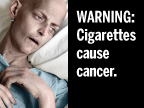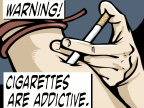November 14th, 2010 by DrWes in Better Health Network, Health Policy, Health Tips, Medical Art, News, Opinion
No Comments »

 The FDA will soon require new cigarette package labeling to deter smoking. So in politically-correct governmental fashion, they are asking which labels you’d like to see. (You can pick your favorites here.) My personal favorite (so far) is the one shown to the left, but its impact factor pales in comparison to this example found in England. (That, my friends, is cancer!)
The FDA will soon require new cigarette package labeling to deter smoking. So in politically-correct governmental fashion, they are asking which labels you’d like to see. (You can pick your favorites here.) My personal favorite (so far) is the one shown to the left, but its impact factor pales in comparison to this example found in England. (That, my friends, is cancer!)
 Ironically, it appears the FDA isn’t too sure how forceful it should be in these warnings about the dangers of smoking. They offer a cornucopia of milquetoast labeling options, many of which contain cartoons. Might such unrealistic portrayals defy they hard-hitting message they want to project? Worse, at least one cartoon (seen here) even seems to promote cigarettes AND drug use together!
Ironically, it appears the FDA isn’t too sure how forceful it should be in these warnings about the dangers of smoking. They offer a cornucopia of milquetoast labeling options, many of which contain cartoons. Might such unrealistic portrayals defy they hard-hitting message they want to project? Worse, at least one cartoon (seen here) even seems to promote cigarettes AND drug use together!
 In an even more astonishing example, some images almost make me what to take up smoking so I can blow big bubbles. Since I could never do this well before, maybe I should take up smoking! Seriously, is an empowerment message what the government wants to portray?
In an even more astonishing example, some images almost make me what to take up smoking so I can blow big bubbles. Since I could never do this well before, maybe I should take up smoking! Seriously, is an empowerment message what the government wants to portray?
Make these labels big, ugly, and real. Anything else is a waste of taxpayer’s money.
-WesMusings of a cardiologist and cardiac electrophysiologist.
*This blog post was originally published at Dr. Wes*
November 14th, 2010 by Davis Liu, M.D. in Better Health Network, News, Opinion, Research
No Comments »

 The Associated Press ran a provocatively-titled piece recently, “Family health history: ‘best kept secret’ in care”, which noted how a geneticist at the Cleveland Clinic discovered that asking about family members and their history of breast, colon, or prostate cancer was better than simply doing genetic blood testing.
The Associated Press ran a provocatively-titled piece recently, “Family health history: ‘best kept secret’ in care”, which noted how a geneticist at the Cleveland Clinic discovered that asking about family members and their history of breast, colon, or prostate cancer was better than simply doing genetic blood testing.
Surprising? Hardly. This is what all medical students are taught. Talk to the patient. Get a detailed history and physical. Lab work and imaging studies are merely tools that can help support or refute a diagnosis. They provide a piece of the puzzle, but always must be considered in the full context of a patient. They alone do not provide the truth. Read more »
*This blog post was originally published at Saving Money and Surviving the Healthcare Crisis*
November 10th, 2010 by BarbaraFicarraRN in Better Health Network, Health Tips, Opinion
No Comments »

In my recent post on KevinMD, “Deeply Connect and Engage Your Patients With Empathy,” I write about how empathy is essential to help empower our patients: “It is with empathy that we can engage and empower our patients.”
Doctors and nurses are leaders in health care.
Being a great leader means having a clear vision, mission or goal. It means being committed, and knowing how to listen and communicate, but it involves much more. It’s about having heart, empathy, and an uplifting spirit.
I value and respect a well written post by Thomas Goetz, author of The Decision Tree: Taking Control of Your Health in the New Era of Personalized Medicine recently published on KevinMD, “How can doctors successfully engage their patients?” Goetz writes about “Five things they should seek to give every patient, strategies to tap the most underutilized resource in medicine, their patient,” however I feel the most critical ingredient is missing, empathy.
Empathy
It is with empathy that we can engage and empower our patients. With empathy and heart we can help our patients feel good, valued and respected. Empathy allows us to engage and empower our patients to take charge of their health and well-being. Read more »
*This blog post was originally published at Health in 30*
November 9th, 2010 by Lucy Hornstein, M.D. in Better Health Network, Health Policy, Opinion
No Comments »

Forgive me for being a little late to the healthcare insurance reform discussion. I was busy, y’know, providing actual healthcare to sick people while that whole rigamarole was going on. But that one sentence, uttered over and over by everyone from the President on down, always stuck in my craw. At long last, I’m finally able to properly articulate my response.
Trying to pass sweeping health insurance reform legislation while telling people that, of course, they “can keep their current plans if they want” is like legislating tough new laws against wifebeating and assuring women that, of course, they can stay with their husbands if they like.
No one tries to force victims of domestic violence to leave their abusers, but they do try to help them understand that they have options, and that they don’t deserve to be treated so poorly. I firmly believe that people who like their current insurance plans probably have several things in common. Read more »
*This blog post was originally published at Musings of a Dinosaur*
November 8th, 2010 by BobDoherty in Better Health Network, Health Policy, News, Opinion
No Comments »

My image of Pittsburgh has been one of a blue-collar, rough-and-tumble town: Perogies, Heinz ketchup, steelworkers, football, and Roberto Clemente. But an exhibit in Pittsburgh’s airport the other day informed me that Pittsburgh also is the home of the iconic “Mr. Roger’s Neighborhood” — the gentle PBS show that entertained toddlers for generations. Mr. Rogers always started the show off with the following verse:
It’s a beautiful day in this neighborhood,
A beautiful day for a neighbor,
Would you be mine?
Could you be mine?
It’s a neighborly day in this beautywood,
A neighborly day for a beauty,
Would you be mine?
Could you be mine?
I have always wanted to have a neighbor just like you,
I’ve always wanted to live in a neighborhood with you.
So let’s make the most of this beautiful day,
Since we’re together, we might as well say,
Would you be mine?
Could you be mine?
Won’t you be my neighbor?
Won’t you please,
Won’t you please,
Please won’t you be my neighbor?
Fittingly, the same week that I was reminded of “Mr. Roger’s Neighborhood,” the American College of Physicians (ACP) released its “medical home neighborhood” position paper. The paper was developed by a workgroup of ACP’s Council of Subspecialty Societies (CSS), which is comprised of representatives of internal medicine subspecialty societies and related organizations.
Read more »
*This blog post was originally published at The ACP Advocate Blog by Bob Doherty*
 The FDA will soon require new cigarette package labeling to deter smoking. So in politically-correct governmental fashion, they are asking which labels you’d like to see. (You can pick your favorites here.) My personal favorite (so far) is the one shown to the left, but its impact factor pales in comparison to this example found in England. (That, my friends, is cancer!)
The FDA will soon require new cigarette package labeling to deter smoking. So in politically-correct governmental fashion, they are asking which labels you’d like to see. (You can pick your favorites here.) My personal favorite (so far) is the one shown to the left, but its impact factor pales in comparison to this example found in England. (That, my friends, is cancer!) Ironically, it appears the FDA isn’t too sure how forceful it should be in these warnings about the dangers of smoking. They offer a cornucopia of milquetoast labeling options, many of which contain cartoons. Might such unrealistic portrayals defy they hard-hitting message they want to project? Worse, at least one cartoon (seen here) even seems to promote cigarettes AND drug use together!
Ironically, it appears the FDA isn’t too sure how forceful it should be in these warnings about the dangers of smoking. They offer a cornucopia of milquetoast labeling options, many of which contain cartoons. Might such unrealistic portrayals defy they hard-hitting message they want to project? Worse, at least one cartoon (seen here) even seems to promote cigarettes AND drug use together! In an even more astonishing example, some images almost make me what to take up smoking so I can blow big bubbles. Since I could never do this well before, maybe I should take up smoking! Seriously, is an empowerment message what the government wants to portray?
In an even more astonishing example, some images almost make me what to take up smoking so I can blow big bubbles. Since I could never do this well before, maybe I should take up smoking! Seriously, is an empowerment message what the government wants to portray?



 The Associated Press ran a provocatively-titled piece recently,
The Associated Press ran a provocatively-titled piece recently, 










